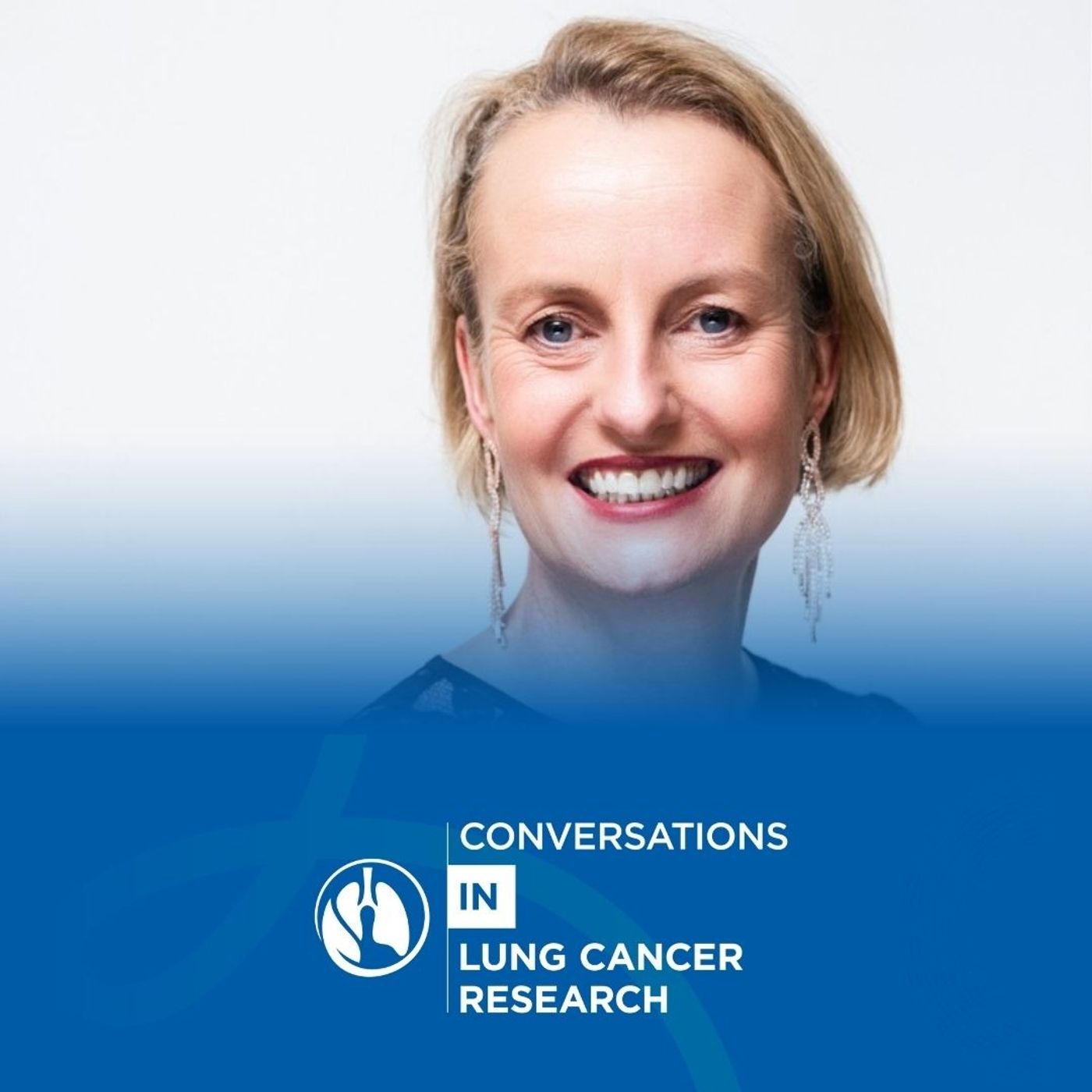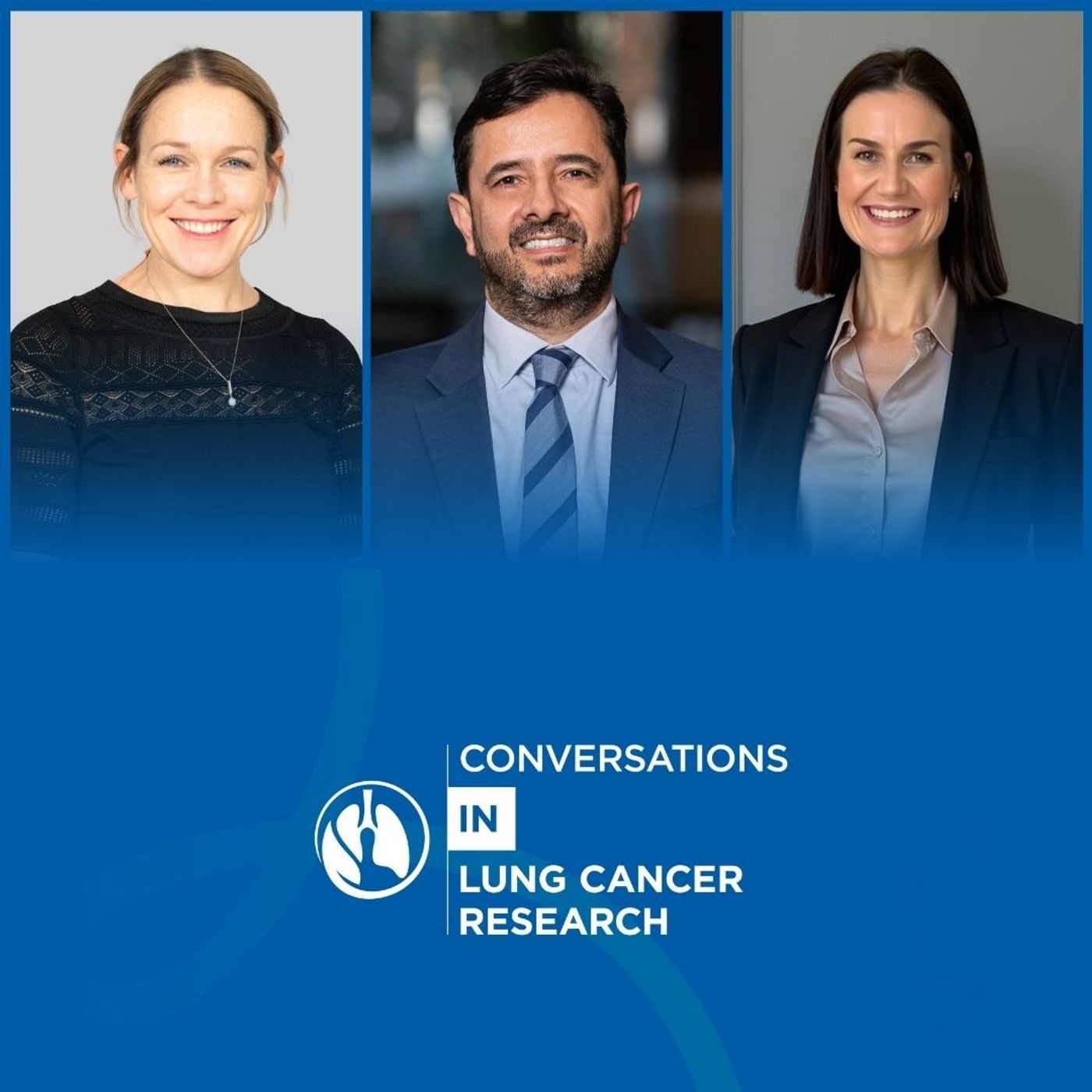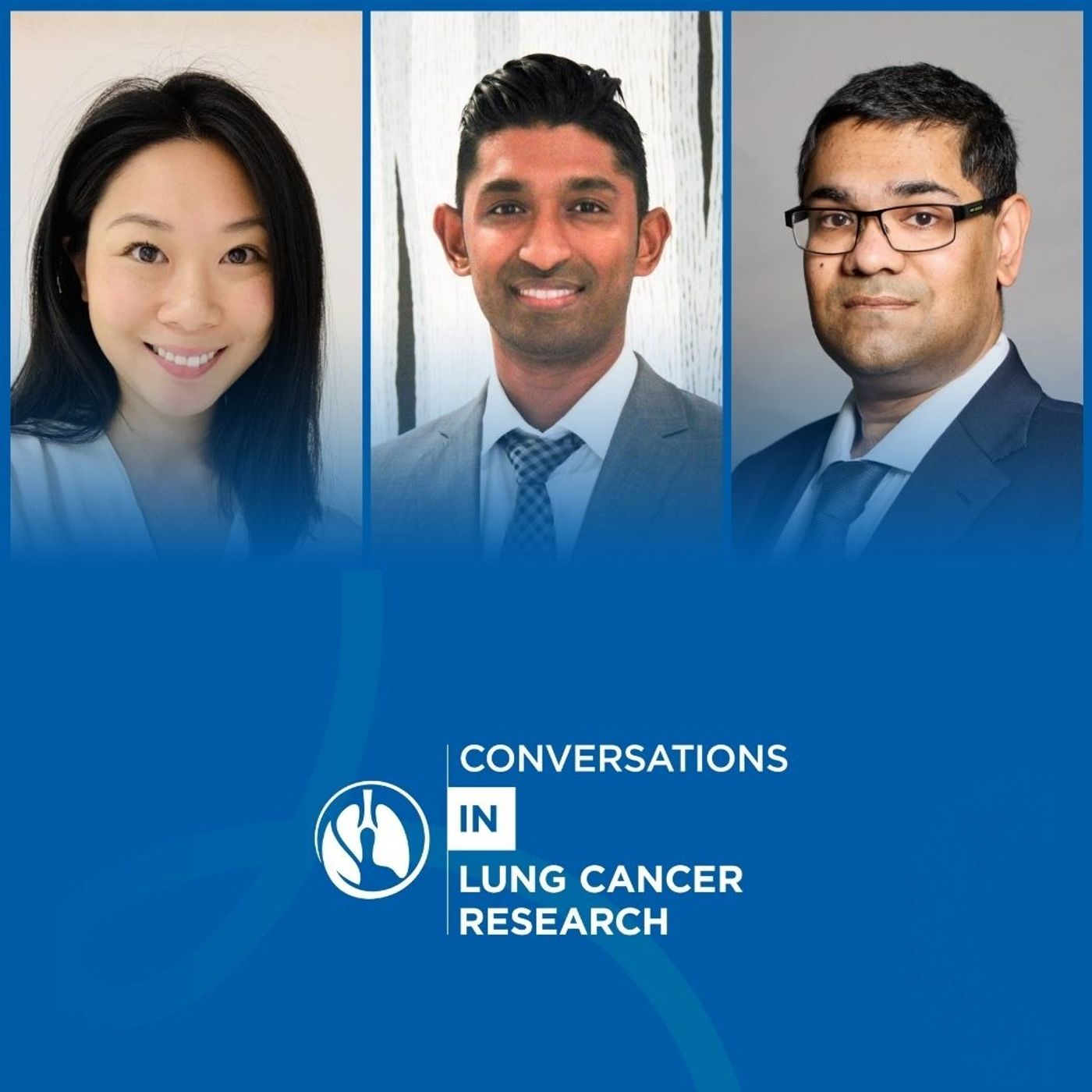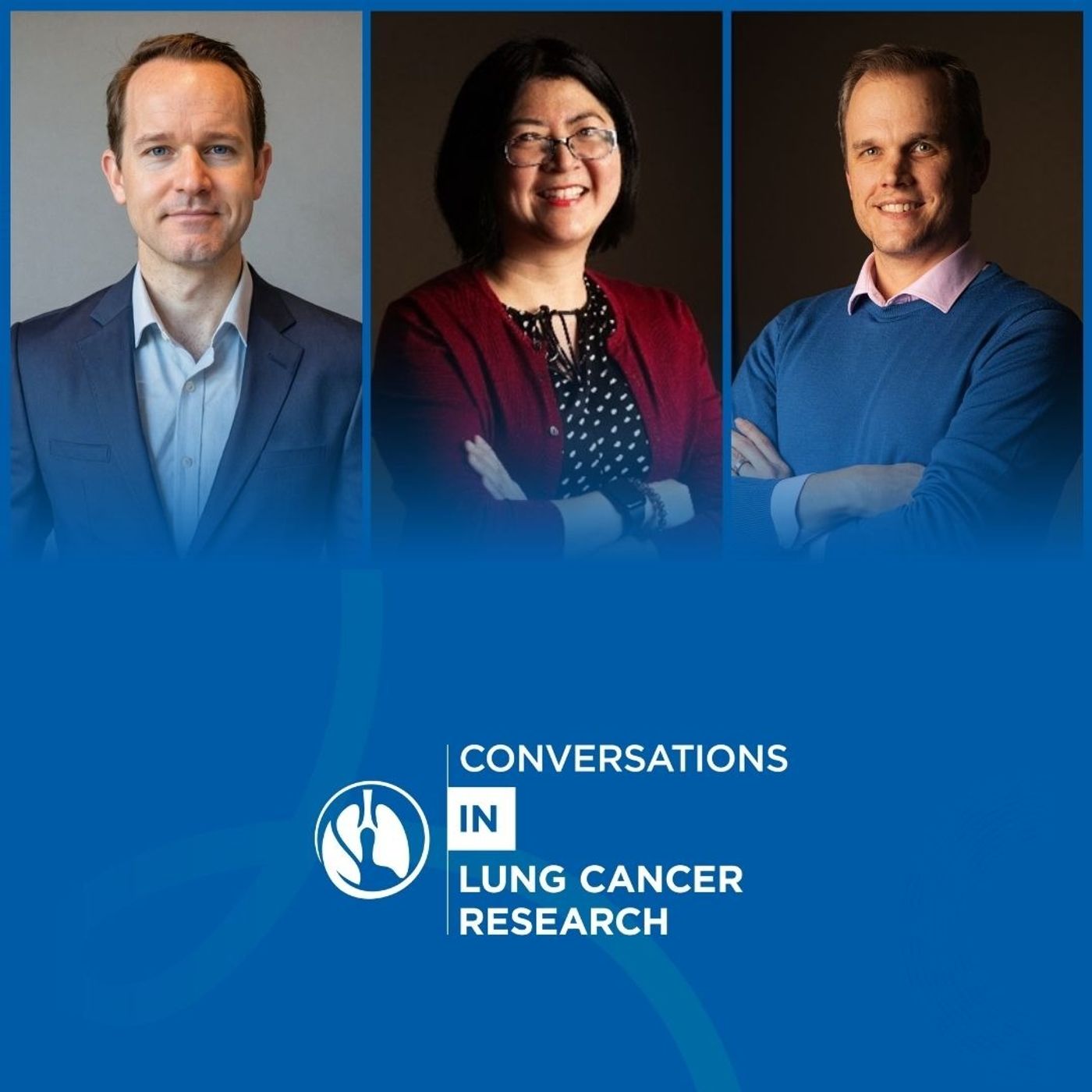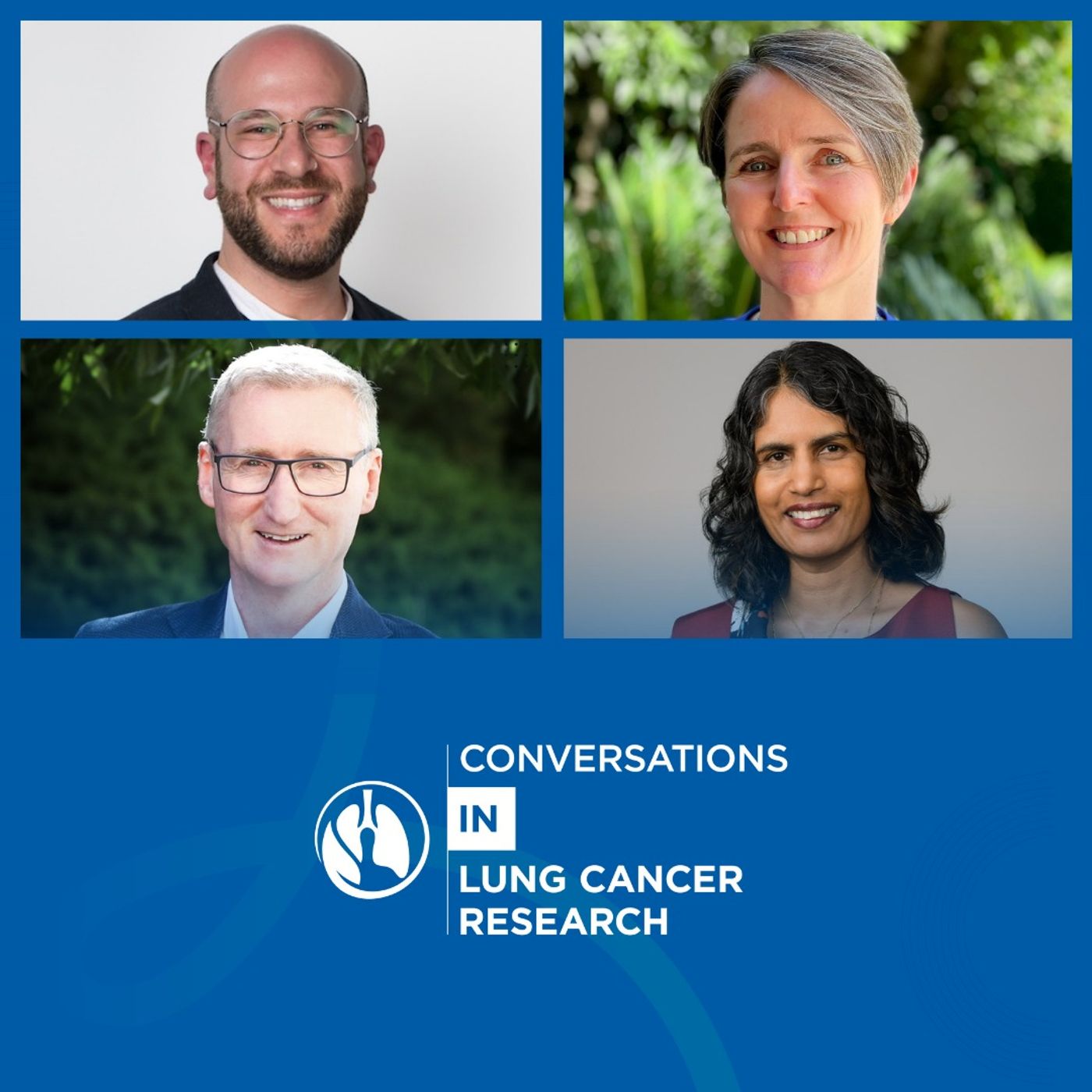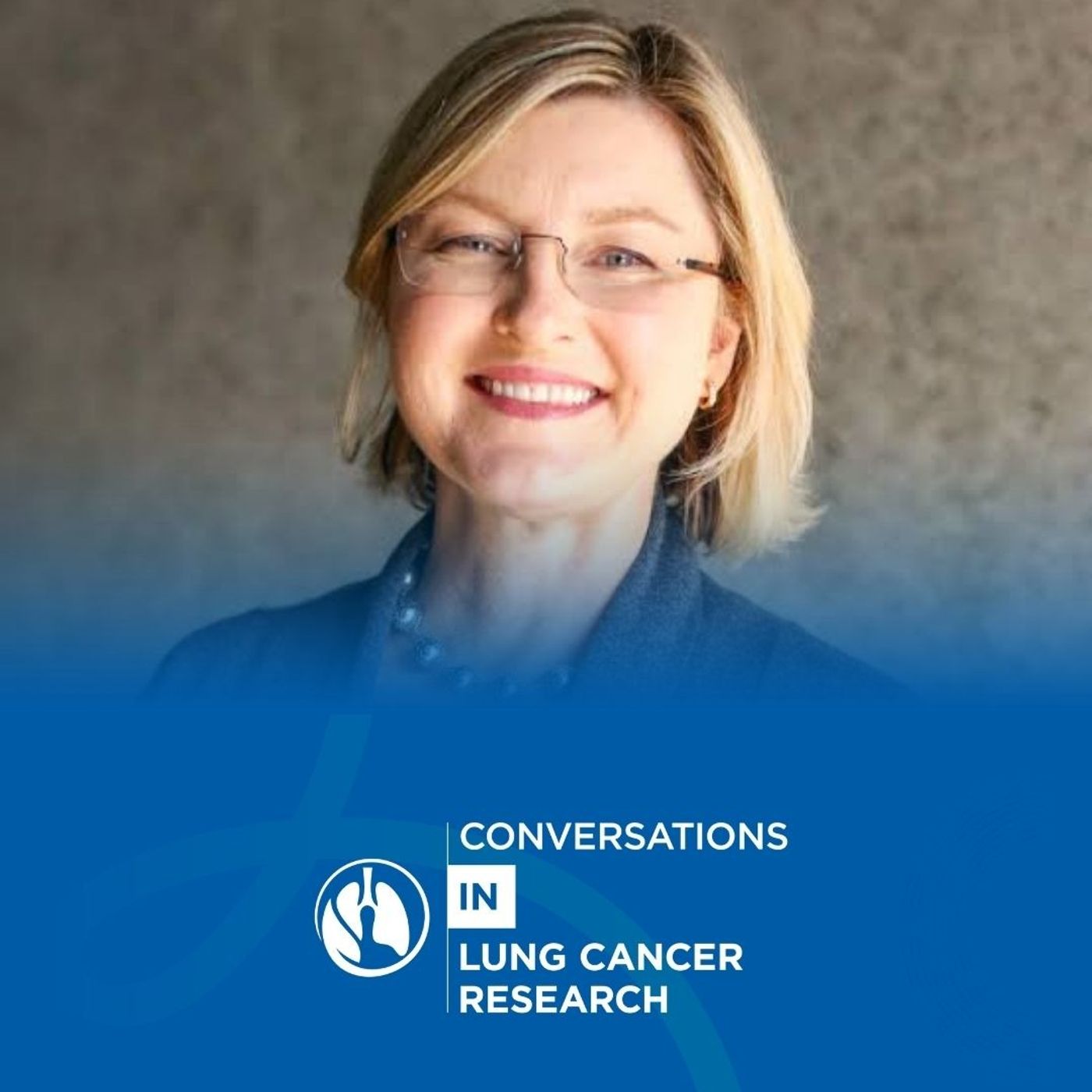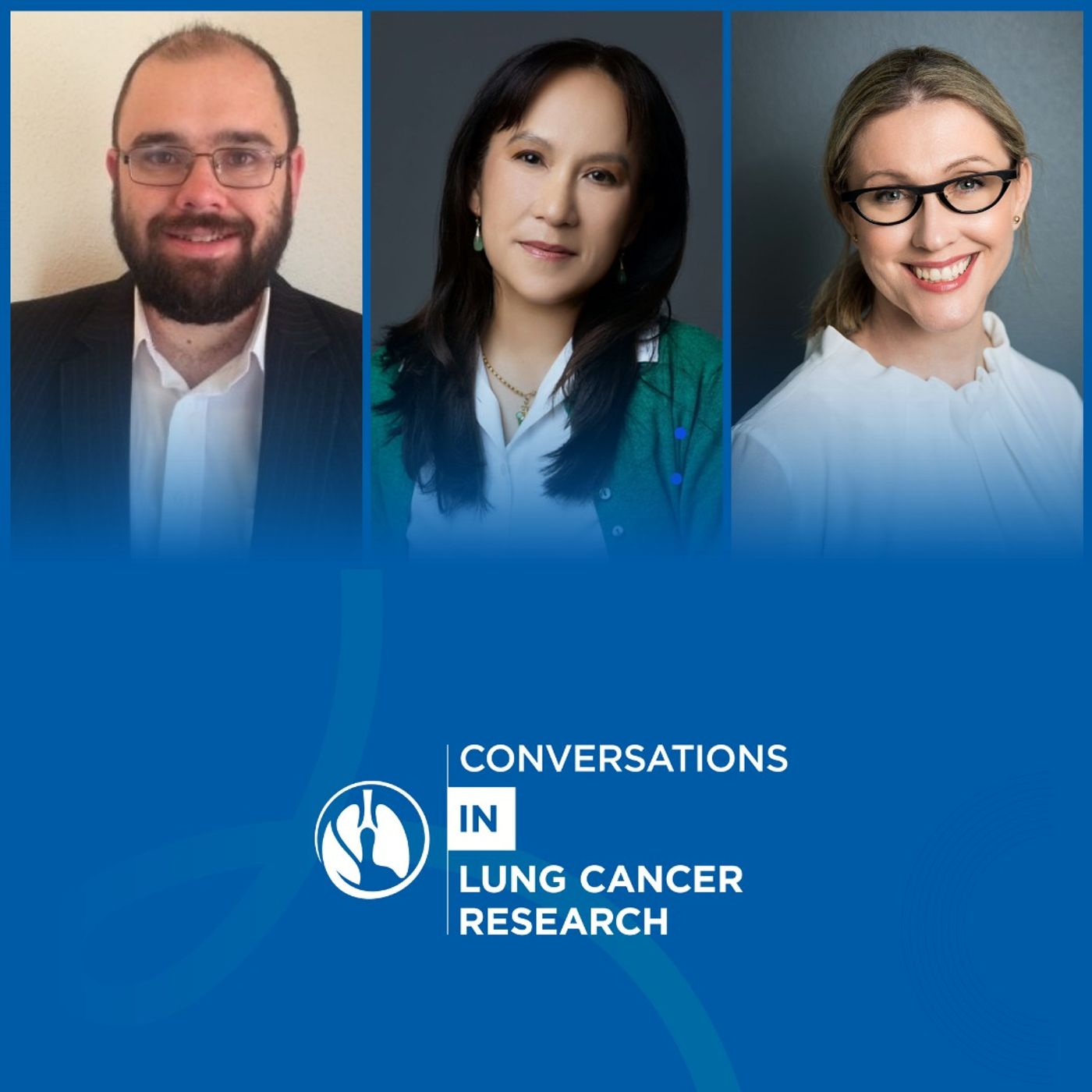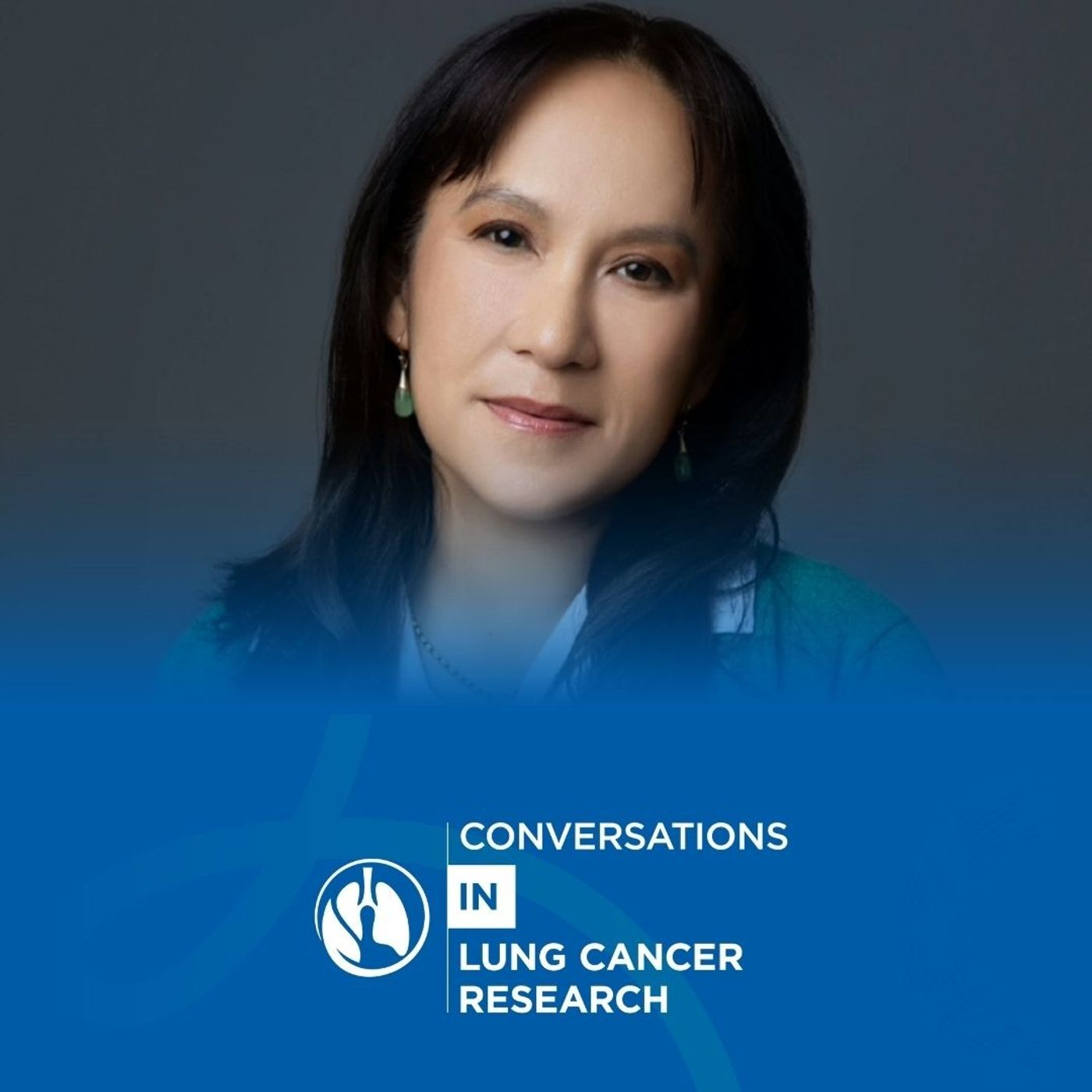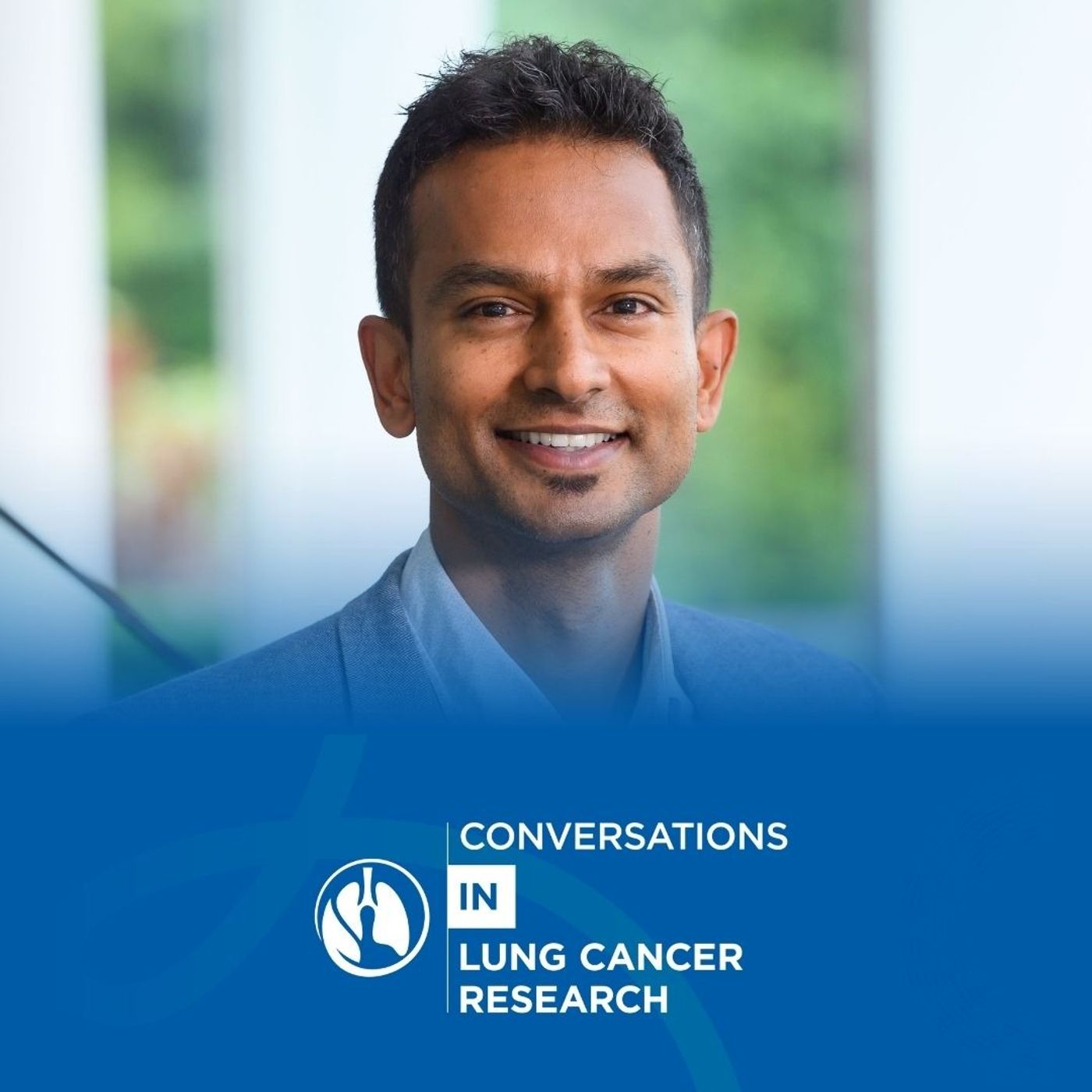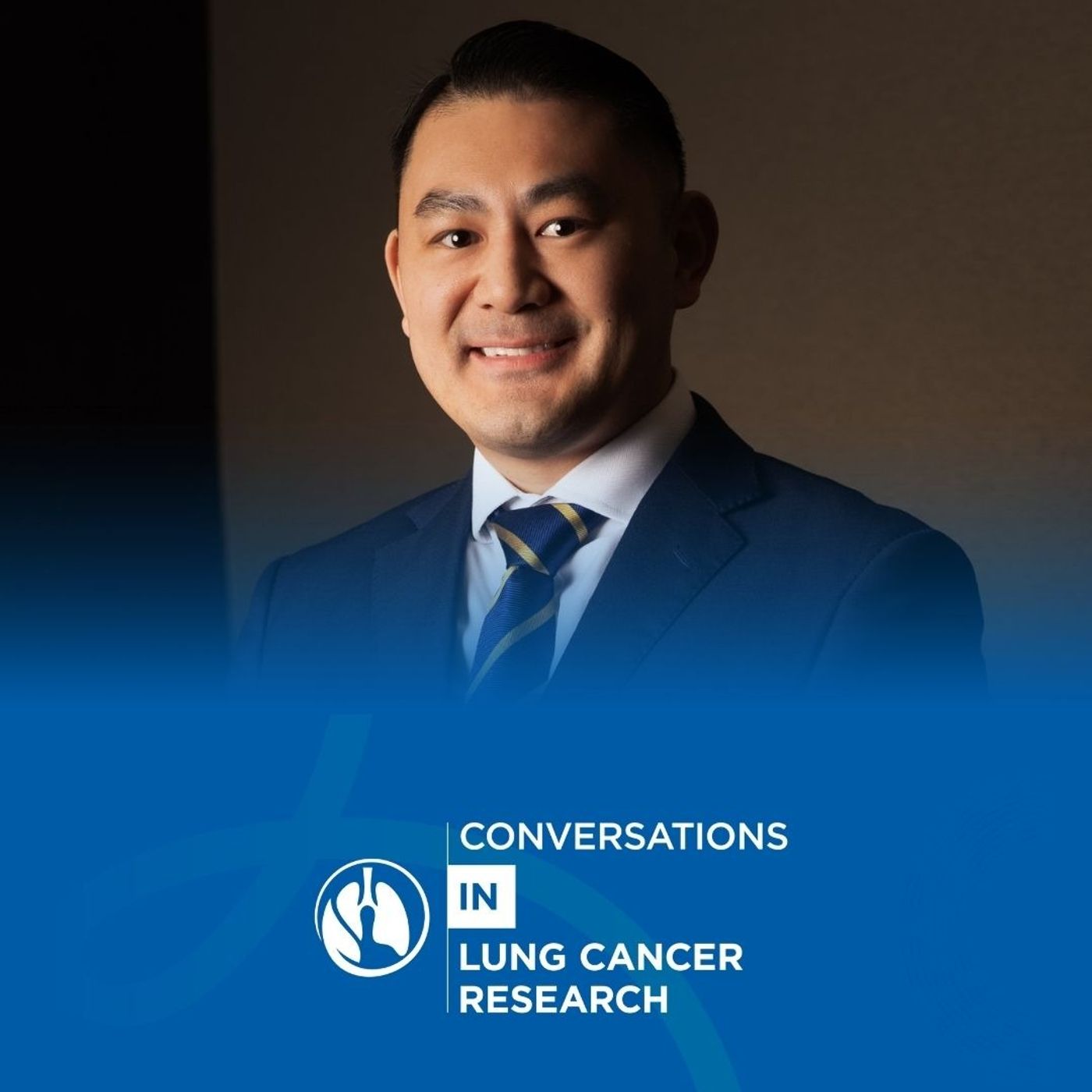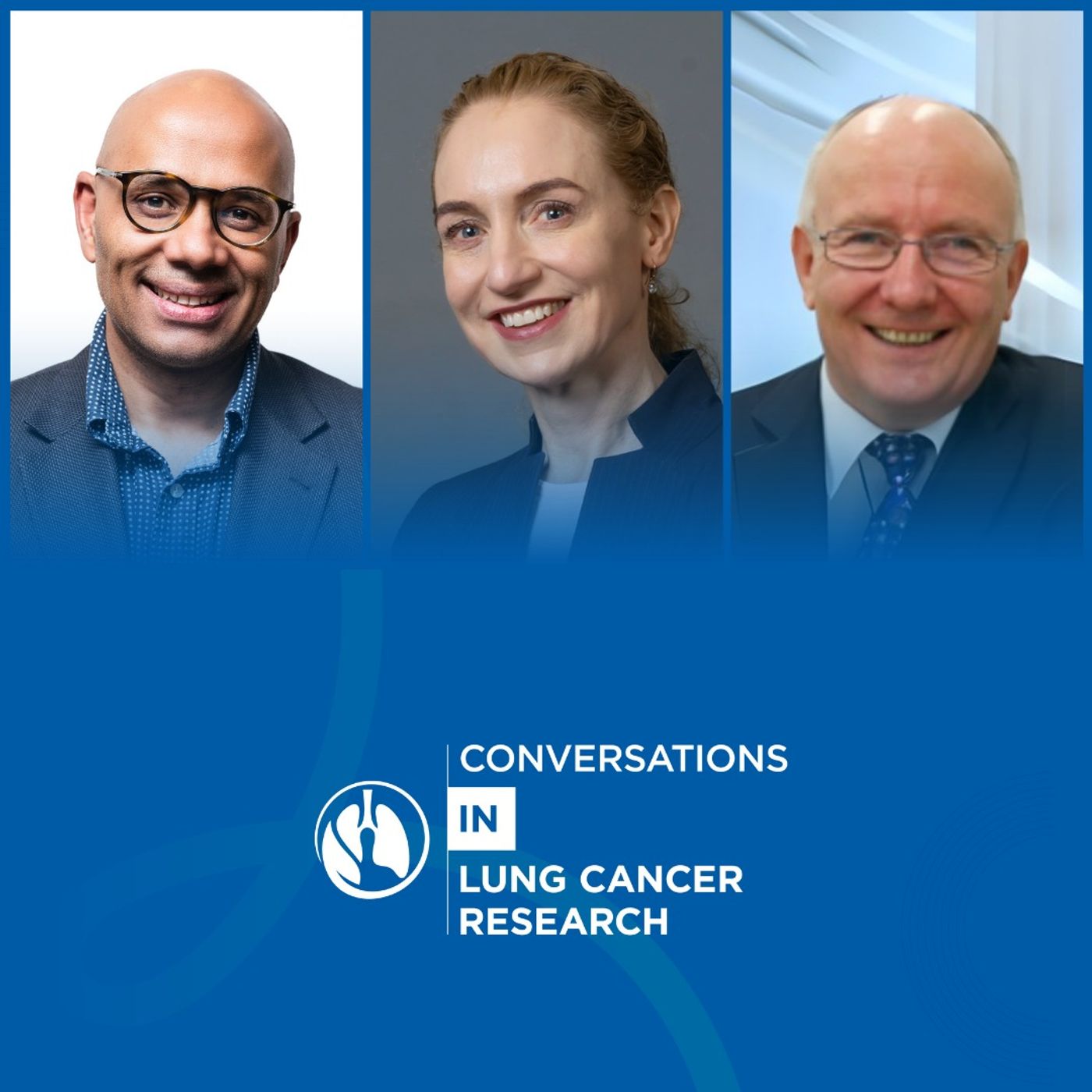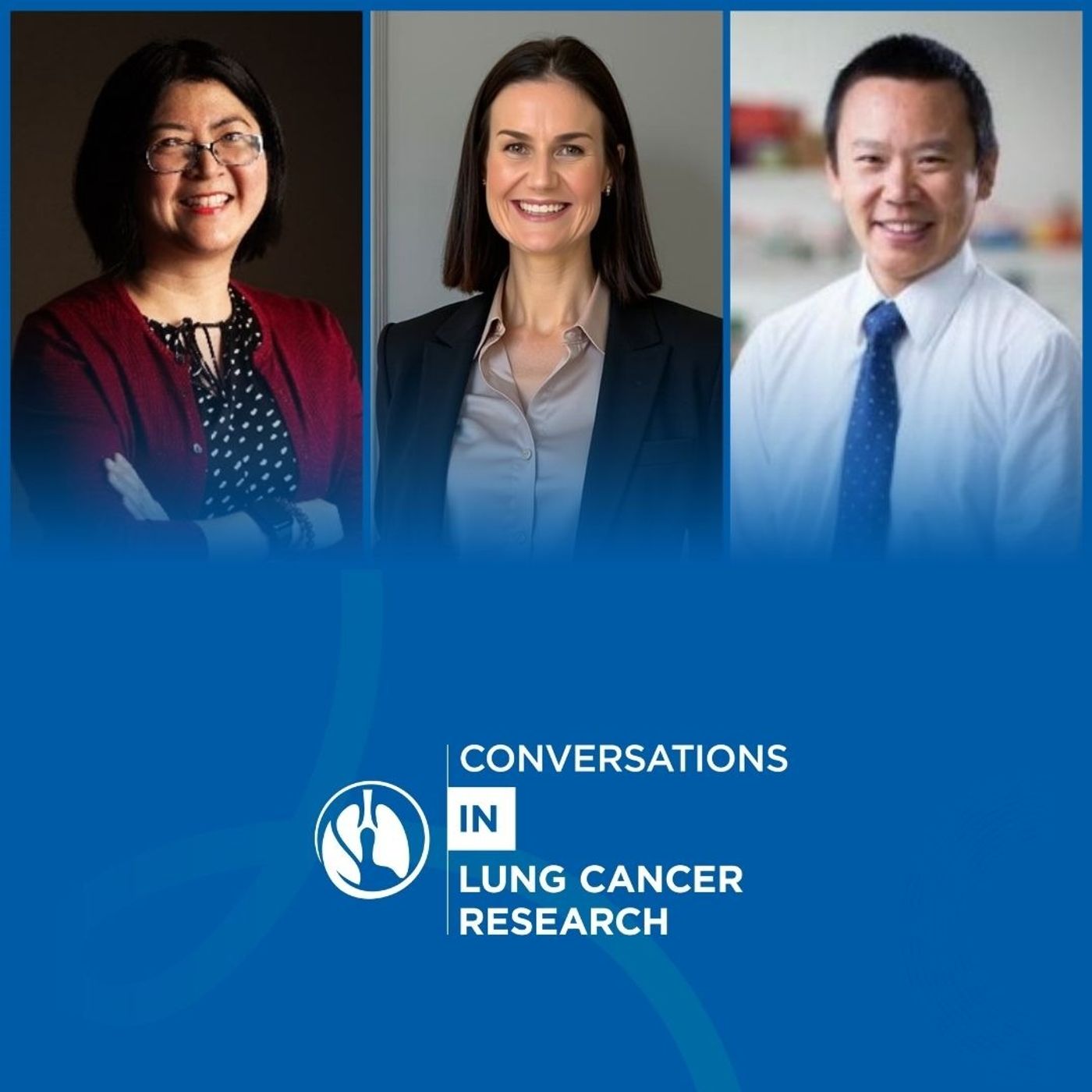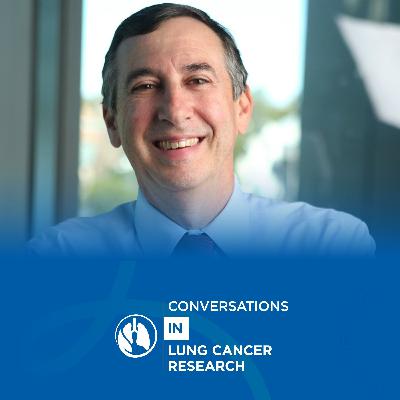Discover Conversations in Lung Cancer Research
Conversations in Lung Cancer Research

Conversations in Lung Cancer Research
Author: Thoracic Oncology Group Of Australasia (TOGA)
Subscribed: 9Played: 232Subscribe
Share
Thoracic Oncology Group Of Australasia © 2020. All rights reserved.
Description
Welcome to Conversations in Lung Cancer Research, presented by TOGA, your go-to podcast for in-depth insights into lung cancer. Tune in for conversations with leading experts, inspiring stories, and the latest updates on clinical trials. Stay informed and empowered in the fight against lung cancer.
63 Episodes
Reverse
In this episode of Conversations in Lung Cancer Research, host A/Prof Mel Moore interviews Dr. Megan Sanders, the Chief Executive Officer of TOGA. They discuss Megan's journey from working in vaccine formulation to earning a PhD in immunology, working in clinical trials, and eventually leading TOGA. They explore the challenges and achievements of TOGA, the importance of multidisciplinary engagement in lung cancer treatment, and the organisation's strategic plan for strengthening research and membership engagement. The conversation touches on the potential of clinical quality registries to improve patient care and highlights the ongoing effort to address the gaps in funding and equitable care for lung cancer patients.(00:00) Introduction and Acknowledgements(00:36) Meet Dr. Megan Sanders: From Science to Leadership(01:21) Journey from Academia to Clinical Trials(05:27) Challenges and Rewards in Clinical Trials(09:24) TOGA's Achievements and Multidisciplinary Approach(26:39) Future Directions and Strategic Plans(36:55) Conclusion and Final Thoughts Links: Dr Megan Sanders https://www.linkedin.com/in/megan-sanders-20130156/TOGA Strategic Plan: https://thoraciconcology.org.au/news/toga/toga-launches-new-strategic-plan-2025-2028-to-advance-thoracic-cancer-research-in-australasia/TOGA ASM 2026:https://thoraciconcology.org.au/events/toga-annual-scientific-meeting-2026/
In this episode of 'Conversations in Lung Cancer Research,' hosted by Associate Professor Mal Itchens, a multidisciplinary panel delves into the ongoing advancements in lung cancer research in Australia and New Zealand. The panel includes Professor Nick Pavlakis from Royal North Shore Hospital and Associate Professor Lauren Troy from Royal Prince Alfred Sydney. Key topics discussed include the 2025 lung cancer screening program, anticipated pharmaceutical benefits scheme (PBS) drug listings for 2026, and the introduction of advanced diagnostic technologies. The conversation highlights the initial impacts of the lung cancer screening program, potential benefits of new ALK inhibitors, and the expanding role of immunotherapy. The episode also explores the future of diagnostic precision with the rise of interventional pulmonology and liquid biopsies. Additionally, it emphasises the growing importance of specialised lung cancer nursing and the integration of novel technologies in oncology practices.00:00 Introduction to Lung Cancer Research Podcast00:37 Panel Introduction and Discussion Overview01:18 Lung Cancer Screening in Australia02:30 Impact of Screening on Diagnostic Services06:45 Screening Program Benefits and Challenges10:34 Future of Lung Cancer Screening15:54 Advancements in Diagnostic Technology20:57 Therapeutic Developments in Lung Cancer24:34 New Drug Listings and Their Impact40:04 Immunotherapy and Future Directions44:13 Conclusion and Final Thoughts
In this episode of 'Conversations in Lung Cancer Research,' host Dr. Rebecca Tay and fellow oncologists A/Prof Surein Arulananda and Dr. Dasantha Jayamanne (DJ) delve into the latest advances in small cell lung cancer treatment.They explore new first-line treatments, including checkpoint inhibitors and emerging novel agents like lurbinectedin and tarlatamab, highlighting their mechanisms, survival benefits, and toxicity management. The panel also discusses the evolving role of radiotherapy and future directions involving precision medicine and biomarkers. This comprehensive discussion aims to inform clinicians and healthcare professionals about the promising advancements reshaping the small cell lung cancer treatment landscape.This episode is sponsored by Roche.TOGA's SCLC Masterclass will take place 20 March 2026, at Novotel on Collins, MelbourneAn advanced workshop covering evolving standards of care and new therapies in SCLC.Early bird tickets available until 16 Feb 2026 > https://thoraciconcology.org.au/events/masterclass-small-cell-lung-cancer/RESOURCES AND LINKS:CREST trial https://pmc.ncbi.nlm.nih.gov/articles/PMC3058352/Caspian Study https://www.sciencedirect.com/science/article/pii/S1525730425001640CHEST RT https://trog.com.au/trials/trog-20-01-chest-rt/DeLLphi-303 https://www.annalsofoncology.org/article/S0923-7534(25)04288-7/fulltextIMforte https://ascopubs.org/doi/10.1200/JCO.2025.43.16_suppl.8006Japan study PCI vs MRIhttps://pubmed.ncbi.nlm.nih.gov/28343976/TIMESTAMPS:(00:00) Introduction and Acknowledgements(00:36) Overview of Small Cell Lung Cancer(02:03) Current First-Line Treatments(06:59) Radiotherapy in Small Cell Lung Cancer(11:36) New Developments in Maintenance and Second-Line Treatments(15:35) Exciting New Therapies and Future Directions(24:01) Radiotherapy and Immune Engaging Therapies(32:53) Conclusion and Future EventsKEYWORDS: SCLC, ES-SCLC, Small Cell Lung Cancer, Early Stage Small Cell Lung Cancer
his episode of 'Conversations in Lung Cancer Research' hosted by Dr Alex Davis, features a discussion with Dr. Laird Cameron and Dr. Annie Wong on the current state of lung cancer care and research in New Zealand. The panel explores the challenges and disparities faced by thoracic cancer patients, particularly among the indigenous Māori population. The conversation highlights the differences between patient populations in New Zealand and Australia, the impact of rurality on cancer care, the importance of clinical trials and multinational collaborations, and the future prospects for lung cancer treatments and interventions. (00:00) Introduction and Acknowledgements(01:01) Exploring Lung Cancer in New Zealand(01:13) Meet the Experts: Dr. Laird Cameron and Dr. Annie Wong(01:48) Challenges in Lung Cancer Diagnosis and Treatment(02:44) Specialisation Stories: Why Lung Cancer?(05:20) Comparing Patient Populations: New Zealand vs. Australia(07:44) Lung Cancer Care Pathways in New Zealand(09:17) Access to Treatments and Therapies(14:57) The Role of Lung Cancer Nurses(18:21) Rural Challenges in Lung Cancer Care(22:06) Radiology and Diagnostic Delays(23:08) CTDNA and Liquid Biopsy in New Zealand(25:03) Strengths and Weaknesses in Lung Cancer Care(29:29) The Impact of Clinical Trials and TOGA(33:00) Future Interventions and Wishlists(39:33) Concluding Thoughts and Farewell
In this episode of Conversations in Lung Cancer Research, hosted by Dr Michael Krasovitsky, a medical oncologist at St. Vincent's Hospital in Sydney, the focus is on lung cancer in older adults. The distinction and application of geriatric oncology are explored through comprehensive discussions with experts: A/Prof Christopher Steer, Prof Shalini Vinod, and Ms Nicole Webb. The conversation delves into the importance of geriatric assessments, the unique challenges faced by older patients undergoing cancer treatment, the impact of ageism, and the necessity of tailored, supportive care. Practical tools and approaches for assessing frailty, treatment decision making, and addressing the stigma surrounding lung cancer and aging are also detailed. The episode underscores the critical need for an open, compassionate, and holistic approach to cancer care in older populations. (00:00) Introduction and Acknowledgements(00:58) Meet the Experts(02:01) Understanding Geriatric Oncology(03:22) Challenges in Clinical Trials for Older Adults(06:53) Geriatric Assessment Tools(10:47) Frailty and Treatment Decisions(14:21)Quality of Life Considerations(17:51) Systemic Therapy Considerations(24:15) Radiotherapy in Older Adults(29:21) Support Systems and Practical Considerations(34:56) Addressing Ageism in Cancer Care(46:19) Stigma and Lung Cancer(49:28) Conclusion and Final Thoughts
In this episode of Conversations in Lung Cancer Research, host A/Prof Mel Moore interviews Prof Anna Nowak, a renowned medical oncologist, clinical trialist, and tumour immunology researcher. We learn of Anna's early aspirations influenced by her family and mentors, her educational and professional trajectory, and her transition to a leadership role as Deputy Vice Chancellor at the University of Western Australia. Anna shares insights on the challenges and rewards of juggling clinical practice with research, her contributions to mesothelioma studies, involvement in the DREAM and DREAMER trials, and her role in mentoring the next generation of oncologists.(00:00) Welcome and Acknowledgements(00:34) Introducing Professor Anna Nowak(01:50) Anna's Journey into Medicine(03:18) Transition to Oncology and Research(05:05) PhD and Early Research Experiences(09:15) Clinical Trials and Mesothelioma Focus(24:58) Leadership and Academic Roles(31:48) Mentorship and Future Aspirations(32:39) Conclusion and Farewell
n this episode of Conversations in Lung Cancer Research, A/Prof Tim Clay discusses the multidisciplinary management of CNS metastases in the context of thoracic cancers. Joined by Dr. Keryn Davidson, a consultant neurosurgeon, and A/Prof Fiona Hegi Johnson, a radiation oncologist, the discussion focuses on the nuances of treating patients with non-small cell lung cancer presenting with brain metastases. Key topics include the role of neurosurgery, decision-making for radiation therapy, evolving approaches for oncogene-driven cancer patients, management of radiation necrosis, and the complexities of treating small cell lung cancer and leptomeningeal disease. This episode is sponsored by Pfizer.(00:00) Introduction and Acknowledgements(00:35) Meet the Experts(01:44) Neurosurgery in CNS Metastases(07:00) Radiation Therapy Insights(13:59) Oncogene-Driven Lung Cancer(25:14) Challenges in Small Cell Lung Cancer(29:56) Advanced Treatment Strategies(32:23) Future Directions and Conclusion
In this episode of 'Conversations in Lung Cancer Research,' A/Prof Mel Moore sits down with A/Prof Fiona Hegi Johnson, a radiation oncologist at the Peter McCallum Cancer Center and senior research fellow at the University of Melbourne. Fiona shares her journey into radiation oncology, highlighting her career progression, the impact of serendipity, and the importance of mentors. They discuss technological advancements in the field, the role of multidisciplinary teams, changes in lung cancer treatments, and clinical challenges. Fiona offers insights into balancing clinical work with research and provides advice for early-career professionals in the field.(00:00) Introduction and Acknowledgements(00:32) Guest Introduction: Associate Professor Fiona Hegi Johnson(01:33) Fiona's Career Journey and Early Challenges(04:08) Choosing Radiation Oncology(06:04) Balancing Clinical and Academic Roles(09:46) Challenges in Radiation Oncology Research(13:45) Technological Advances in Lung Cancer Treatment(17:22) Multidisciplinary Team Dynamics(23:03) Fiona's Role in TROG and Mentorship(28:32) Advice for Early Career Professionals(30:02) Conclusion and Final Thoughts
In this episode of TOGA's Conversations in Lung Cancer Research, A/Prof Mel Moore speaks with Prof Shankar Siva about his groundbreaking work in radiation oncology, particularly focusing on the PRIME Lung study. They discuss the journey from concept to large clinical trials, the challenges of grant applications, the importance of controversial ideas in research, and the role of industry funding. Shankar also shares insights into his interest in genitourinary cancers and the future of radiation therapy, emphasising the significance of mentorship and practical advice for junior radiation oncologists.00:00 Welcome and Introduction00:33 Meet Professor Shankar Siva01:26 Prime Lung Study Overview02:32 Building on Previous Research04:00 From Concept to Large Trial06:11 International Collaborations07:16 Tips for Clinician Researchers12:11 Industry Funding in Radiation Oncology14:33 Interest in Genitourinary Cancers19:34 The Role of Mentorship25:09 Advice for Junior Colleagues28:25 Conclusion and Final Thoughts
This episode of 'Conversations in Lung Cancer Research' features Dr. Anna McLean, Dr Mark Adams, and Dr Sagun Parakh, discussing research on the microbiome and its influence on lung cancer treatment outcomes. They delve into the differences between the gut and lung microbiomes, methods for studying these microorganisms, and the potential for the microbiome to serve as biomarkers for treatment response and immune-related adverse events. They also cover the importance of collaboration and larger data sets in advancing this promising area of research.(00:00) Introduction(01:47) Understanding the Microbiome(03:40) Gut and Lung Microbiome Relationship(05:07) Challenges in Lung Microbiome Research(05:37) Microbiome's Role in Lung Cancer Risk(06:57) Techniques for Studying the Microbiome(10:33) Collaborative Efforts in Microbiome Research(16:09) Potential of Microbiome Modulation(20:35) Patient Advice and Future Directions(25:33) Conclusion and Final Thoughts
In this episode of Conversations in Lung Cancer Research, we welcome A/Prof Bryan Chan, a senior Medical Oncologist and this years TOGA ASM Convener. Bryan, affiliated with multiple institutions including Adam Crosby Cancer Center and Griffith University, discusses his comprehensive career journey from fellowship at the Princess Margaret Cancer Center in Toronto to his current roles in Australia. The discussion highlights the benefits of overseas fellowships, the development of clinical trials, and his leadership in thoracic oncology at the Sunshine Coast University Hospital. Bryan also touches upon the challenges and rewards of balancing private and public practice and pioneering quality improvement initiatives. The episode concludes with an exciting preview of the upcoming TOGA Annual Scientific Meeting, which Bryan is convening. Medical professionals and anyone interested in the latest in lung cancer research and practice will find valuable insights in this conversation with Bryan. (00:00) Welcome and Introduction(00:41) Guest Introduction: Associate Professor Brian Chan(02:12) Brian's Fellowship Experience at Princess Margaret Cancer Center(03:44) Benefits of Overseas Fellowships(06:58) Transitioning Back to Australia(08:29) Balancing Public and Private Practice(10:08) Establishing a Quality Committee(15:02) Building a Clinical Trials Unit(18:15) Advice for Junior Consultants(21:19) TOGA Annual Scientific Meeting Preview(25:39) Conclusion and Farewell
In this episode of Conversations in Lung Cancer Research, A/Prof Mel Moore speaks with Prof Wendy Cooper, a leading pathologist in cancer research. They discuss Wendy's journey into pathology, the evolution of lung cancer diagnostics, the impact of AI and liquid biopsies, and the importance of international collaboration in research. Wendy shares insights on the challenges of equitable access to cancer diagnostics and the pressures faced by pathologists in multidisciplinary meetings. The conversation concludes with advice for junior clinicians on career development and involvement in professional organisations.(00:00) Introduction and Acknowledgements(00:36) Introducing Prof Wendy Cooper(01:32) Wendy's Path to Pathology(04:42) The Evolution of Lung Cancer Pathology(08:18) The Role of AI in Pathology(10:30) Translational Research and International Collaboration(14:09) Molecular Testing Guidelines in Australia(18:05) Challenges and Future Directions in Pathology(26:52) The Impact of Lung Cancer Screening Programs(29:08) Final Thoughts and Advice
In this episode of 'Conversations in Lung Cancer Research,' Professor Tom John from the Peter MacCallum Cancer Centre in Melbourne discusses the significant progress and excitement surrounding cancer vaccines, particularly their emerging role in lung cancer treatment.He is joined by Professor Ken O'Byrne, a medical oncologist and clinical scientist at the Princess Alexandra Hospital and Queensland University of Technology, and Professor Georgina Long AO, the medical director of the Melanoma Institute of Australia and co-recipient of the 2024 Australian of the Year.The experts delve into technological advances spurred by COVID-19 vaccine development, promising results from recent melanoma and lung cancer vaccine trials, and the potential for personalised neoantigen mRNA vaccines. They also discuss historical challenges in vaccine efficacy and the promising future of immunotherapy and cancer vaccines, including patient perspectives and the logistics of rapid vaccine production and distribution.00:00 Introduction03:15 Historical Context of Cancer Vaccines05:13 Technological Advances in Vaccine Development06:53 The Promise of mRNA Technology14:03 Personalised vs. Off-the-Shelf Vaccines18:02 Identifying Neoantigens for Vaccines21:13 Caution and Optimism in Vaccine Development23:18 Exploring Tumour Mutation Burden and Vaccine Bias29:35 Challenges and Opportunities in Metastatic Disease33:53 Immunotherapy and Vaccine Hesitancy37:52 Future of Cancer Vaccines and Rapid Innovation42:14 Conclusion and Final Thoughts
In this episode of Conversations in Lung Cancer Research, Dr. Malinda Itchins, Dr. Annie Wong, and A/Prof Stephen Kao discuss the concept of liquid biopsy, its advantages and limitations, and its clinical applications in lung cancer treatment. They explore how liquid biopsy can provide faster diagnosis and treatment options, especially for patients who cannot undergo traditional tissue biopsies. However, they also address the challenges of sensitivity and the need for further research to integrate liquid biopsy into routine clinical practice.This episode is sponsored by: AstraZeneca Daiichi Sankyo Australia SOPHiA Genetics Thermo Fisher Scientific(00:00) Introduction and Acknowledgements(01:16) Meet the Experts(02:10) Understanding Liquid Biopsy(03:01) Advantages of Liquid Biopsy(06:21) Limitations of Liquid Biopsy(09:15) Clinical Scenarios for Liquid Biopsy(13:15) Barriers and Future Directions(19:39) Conclusion and Thank You
In this episode of Conversations in Lung Cancer Research, A/Prof Mel Moore, along with thoracic oncologists Dr. Malinda Itchins and A/Prof Surein Arulananda, delve into the characteristics, detection, and treatment of EGFR exon 20 insertion mutant non-small cell lung cancer. The podcast discusses recent advances, the efficacy of various treatments including small molecule tyrosine kinase inhibitors and monoclonal antibodies, and the potential future of targeted therapies. Special focus is given to the Phase 3 Papillon study and the drug Amivantamab, highlighting the need for next generation sequencing in clinical settings. Key challenges and questions in the field are also addressed, including the impact of co-mutations and optimal therapy sequencing.This episode is sponsored by: Johnson & Johnson(00:00) Introduction and Acknowledgements(00:48) Introducing the Experts(01:29) Understanding EGFR Exon 20 Insertion Mutations(05:04) Challenges with Current Treatments(06:30) Emerging Therapies and Clinical Trials(11:03) Papillon Study Insights(21:27) Future Directions and Unanswered Questions(29:34) Conclusion and Final Thoughts
In this episode of Conversations in Lung Cancer Research, A/Prof Mel Moore interviews Prof Michael Boyer, AM about his extensive career in medical oncology and his current role as CEO of Chris O'Brien Lifehouse. They discuss his early interest in oncology, the influential mentors in his career, and the evolution of lung cancer treatment and research. Michael shares his perspectives on leadership in medical and research roles, the importance of building relationships, and the balance between industry-sponsored and cooperative group research. They also touch upon professional challenges, emotional resilience in oncology, and Michael's vision for the future of his career and the field of oncology. (00:00) Welcome and Introduction(01:04 )Guest Introduction: Professor Michael Boyer(02:25) Michael Boyer's Early Career and Mentorship(07:27) Leadership Roles and Challenges(11:33) Involvement in Clinical Research(21:03) Emotional Aspects of Oncology(29:38) Future of Oncology and Career Advice(33:06) Conclusion and FarewellResources and Links:International Association for the Study of Lung Cancer https://www.iaslc.org/Chris O'Brien Lifehouse https://www.mylifehouse.org.au/Schwartz Rounds https://www.theschwartzcenter.org/programs/schwartz-rounds/
In this introductory episode, Associate Professor Mel Moore, medical oncologist and education chair at TOGA, announces the evolution of TOGA podcasts to 'Conversations in Lung Cancer Research.' The podcast will continue to deliver the latest breakthroughs in lung cancer research while expanding to include deeper dives and engaging discussions with experts in thoracic oncology. Listeners can look forward to unique insights from researchers, clinicians, and key thought leaders shaping the future of lung cancer care.
We have witnessed incredible advances in therapy since ALK was discovered in 2007, starting from the pivotal PROFILE 1001 study of crizotinib in advanced ALK positive NSCLC to present day where we now have five approved targeted agents, with increasing potency, selectivity and CNS activity with each successive generation of drug. Despite these advances in therapy, the emergence of treatment resistance in the TKI still remains one of greatest challenges in the clinic. Our TOGA podcast panel discuss the clinical and genetic factors affecting treatment choice, sequencing and resistance patterns, including oligoprogression and local therapy considerations.
Dr Rebecca Tay, Medical Oncologist at Royal Hobart Hospital and ICON Hobart, is joined in this discussion by Professor Ben Solomon, Medical Oncologist at Peter MacCallum Cancer Centre & Board member, Scientific Chair of TOGA and Associate Professor Michael Ng, Radiation Oncologist at GenesisCare St Vincents Hospital Melbourne and Head of Stereotactic Radiotherapy at GenesisCare Victoria.
References:
CROWN: ascopubs.org/doi/10.1200/JCO.24.00581
Gomez paper denovo oligomet SABR
pubmed.ncbi.nlm.nih.gov/31067138/
Kroeze – concurrent systemic therapy + SABR consensus
sciencedirect.com/science/article/abs/pii/S1470204522007525
Tsai Curb trial RCT for oligoprogression
pubmed.ncbi.nlm.nih.gov/38104577/
In this episode, we discuss the clinical and diagnostic markers when identifying a rare sub type of NSCLC, large-cell neuroendocrine carcinomas (LC-NEC), and provide insights into the management of these patients and future treatment developments.
Associate Professor Rachel Wong, Deputy Director Oncology Eastern Health and Medical Oncologist at Epworth East in Melbourne is joined by Dr Patrick Hosking, Senior Histopathologist at Eastern Health Pathology; Dr Mal Itchins, Thoracic Medical Oncologist at Royal North Shore Hospital and Chris O'Brien LifeHouse in Sydney and Dr Sagun Parakh, Medical Oncologist at the Austin Hospital, Lung Cancer Lead.
https://www.omico.com.au/our-programs/cancer-screening-program-casp/


